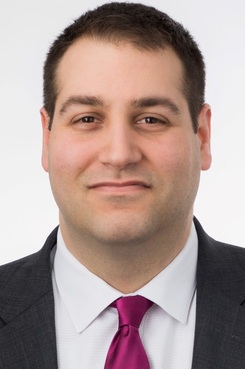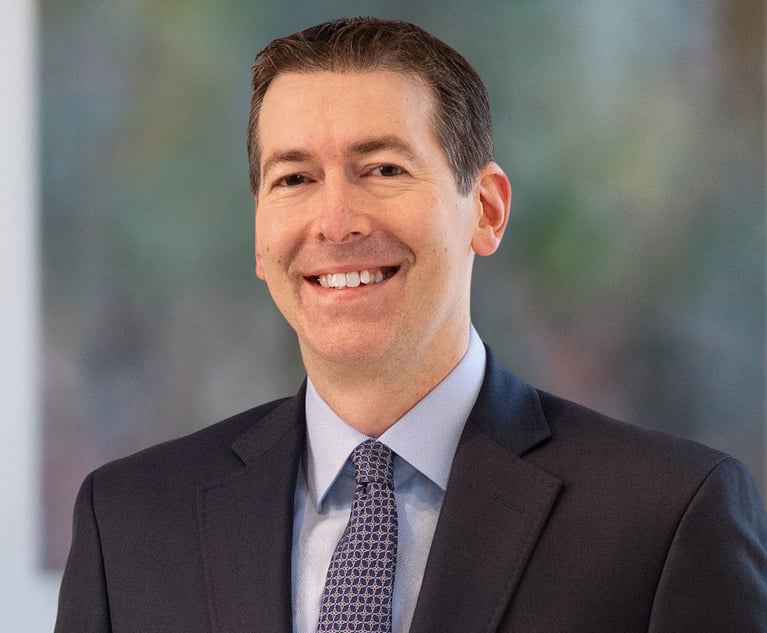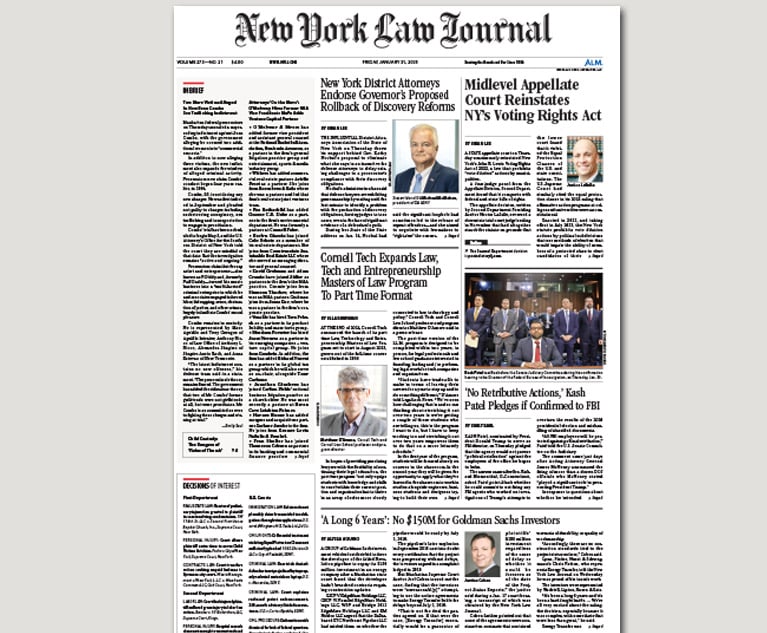NY-Based Reed Smith Lawyer Goes Public With His Story About How He Overcame Depression
Reed Smith counsel Mark Goldstein wasn't sure he could both be a lawyer and have mental health disabilities. But he learned how to survive and thrive in Big Law.
March 12, 2019 at 03:53 PM
10 minute read
The original version of this story was published on The American Lawyer

It was Oct. 16, 2017. A Monday. My wife's 32nd birthday. A day after the Jets blew a 14-point lead to the Patriots. It was also what I thought would be the last time I would ever walk through the halls of Reed Smith, the law firm at which I had spent the past four-plus years.
Roughly six weeks earlier, I had been diagnosed with severe depression, obsessive-compulsive disorder (OCD) and anxiety. I felt scared. Ashamed. Crippled. As if I was going to die. Perhaps most of all, I felt alone, particularly in a profession that often stigmatizes mental health disorders. A profession that tends to label them, instead, as “burnout,” or sweep them under the rug. The symptoms of my conditions, which had likely been percolating for some time, came on suddenly and swiftly over Labor Day weekend 2017. These symptoms included not only mentally crippling cognitions, but also physically impairing side effects as well. By early the following week, I knew that this was no mere passing phase; it could not be ignored.
For the next month and a half, I sought the counsel of a small circle of family, friends and colleagues. With their support, I searched high and low for a path to reclaim a life that I felt slipping further away by the day. I attempted to persevere with my personal and professional lives. This, unfortunately, proved futile. My relationships with my wife and son continued to deteriorate, due largely to my own self-imposed isolation. As for work, I simply could not function. In fact, I spent most of my time parked on the couch in one of Reed Smith's wellness rooms. And when, between panic attacks, I could stomach being in my office, I was often held hostage by symptoms of my OCD.
Eventually, I realized that the “stigma” associated with mental health issues—particularly for lawyers—and suffering in silence, paled in comparison to the need to protect my personal well-being. I realized that I needed time away to address my issues head-on. To seek professional care and help. To salvage whatever semblance I could of my life as a husband, father, lawyer.
 Mark S. Goldstein of Reed Smith
Mark S. Goldstein of Reed SmithOn Oct. 12, I mustered the courage to inform Reed Smith of my decision to take a leave of absence. The firm was exceedingly supportive and conveyed a clear message: take all the time you need to recover. Still, as I turned off the lights in my office on Oct. 16—the day before my leave began—I was confident I would never set foot on that gray/brown carpet ever again. I was confident that I would not and could not recover; that there would be no light at the end of the tunnel for me (and, frankly, no end of the tunnel). At least not while I remained a lawyer.
Over the next 11 weeks, I underwent an oft-challenging journey of self-reflection. I re-evaluated both my personal and professional goals. On an almost weekly basis, I met separately with a psychiatrist, psychologist and cognitive behavioral therapist. I began taking—and still to this day take—prescription medication to treat my mental disabilities. I also came to terms with the fact that the conditions from which I suffer are indeed disabilities, no different from physical impairments. With the help of a mindfulness coach, I took up meditation. I began running again, and went for long walks in the nature preserve near my home in Maplewood, New Jersey. I spent more time—quality time—with my wife and son. I started engaging in activities that had fallen by the wayside, due to my conditions, for many months prior. Many of these were unremarkable, mundane activities that I had previously taken for granted. Listening to music, watching movies, smiling, laughing, even reading legal publications.
By year-end, I felt like my old self again. I wasn't “cured,” nor will I ever be. But I was finally ready to hit the play button on a life then on pause. I returned to Reed Smith on Jan. 2, 2018. Although my office, as if frozen in time, had not changed one bit, I still had no idea what to expect. Would I be welcomed back, shunned or something in between? While the firm had been tremendously supportive both before and during my leave of absence, was that mere rhetoric?
Quite quickly, I came to realize that it was not. In fact, 2018 proved to be perhaps my most fulfilling year as an attorney. Reed Smith, including everyone from the partner with whom I work most, to the labor and employment group more broadly, to management, HR, support staff and beyond, welcomed me back with open arms. I was treated as if nothing had happened and no time had passed. I felt no stigma or shaming. Quite the contrary, I worked with an even broader swath of attorneys and on even more exciting matters. I joined LEADRS, Reed Smith's disability affinity group. The firm helped me overcome what I had previously believed to be an insurmountable obstacle.
How to Survive and Thrive
After much contemplation, I now feel comfortable sharing my story. My hope is to reach and help other legal professionals suffering with mental health issues. With that in mind, and with the obvious caveat that I have no formal mental health training, the following are a few tips for anyone who has or may find themselves in a situation similar to mine:
Speak up—and now. Forget about the perceived stigma surrounding mental health issues (and, yes, I know that's easier said than done). There is literally nothing more important than your health and well-being. Be it a friend, family member, colleague, HR representative or someone else (feel free to make it me), you need to find at least one person in whom you can confide the gravity and extent of your struggles. You will not reach your professional goals—or, likely, your personal ones either for that matter—if you suffer in silence.
Contact a medical and/or mental health provider (some firms provide these services free-of-charge through employee assistance programs). Many mental health disabilities can be treated and contained through medication, therapy, a combination of both or some other means. A licensed professional will be able to work with you to determine the necessary approach based on your particular set of circumstances.
Figure out what you want your priorities to be … then act on them. If you want to spend more quality time with loved ones, figure out a way to do it. If the endorphins produced through exercise boost your mental state, find even a sliver of time for a workout. Whatever is most important to you—both personally and professionally—needs to be taken front and center.
Learn to how to breathe properly (yes, that's a real thing). Then breathe, breathe and breathe some more. I cannot say enough about the benefits of proper breathing through meditation and mindfulness.
Don't be too hard on yourself. As I dole out this advice, it occurs to me that I don't always follow these eight tips on a daily basis. But I strive to. Sometimes I fall short, sometimes I don't. On the days when I achieve my goals, I am grateful for that (see the next tip). On the days when I don't, I try not to beat myself up over it. There will, in fact, be a tomorrow and another opportunity to reach for the gold.
Show gratitude in the good times. Anyone suffering from a mental health disorder knows there are good times and bad. In the good times, show gratitude for the people and things that make you happy. It can be a small gesture, like sending a thank you email to someone who went above and beyond to help you on a project, but I have found that practicing and projecting gratefulness is one of the easiest ways to improve your mental health. (To those who helped me in my time of need—and there are simply too many to list, but I think you know who you are—I am forever in your debt.)
'You Are Not Alone'
Don't assume that others are not sensitive to or understanding of your situation. Perhaps the most enlightening revelation of the past year, for me, has been discovering that other attorneys with whom I work, whom I respect, and who seem so poised and polished, are also suffering mental health issues and have sought/are seeking treatment for the same. As mental health has become a more acceptable topic of public discussion, I am glad to have seen other attorneys come out of the woodwork to share their personal journeys. Which leads me to my final point, and this is critically important: Remember that you are NOT alone.
I cannot emphasize this enough. We are beginning to see the development of some fantastic resources and infrastructure for attorneys who suffer from mental health disabilities (e.g., Quinn Emanuel Urquhart & Sullivan partner Joe Milowic's Lawyer Depression Project). Take advantage of these resources and recognize that there are many other individuals in the same predicament as you. Listen to their stories and, of course only if you feel comfortable, share your own. Ask what helped them make it through the bad times and offer tips of your own. There is no singular attorney or law firm that can eradicate the mental health issues that are pervasive in the legal industry. However, if enough of us band together, we can create a support network that hopefully eviscerates the stigma associated with our disorders and helps others in their recovery.
I started this article with a date. I want to end it with another: Dec. 9, 2018. That was the day I learned that, less than 12 months after my return to work, Reed Smith had voted to promote me to counsel. While we are not and should not be defined exclusively by our professional achievements, this was, for me, the culmination of many months of hard work, both on a professional and, more importantly, a personal level. It was a day that, a year and a half earlier, I didn't know whether I would be alive to see.
As I said above, I will never be cured and, if you also suffer from mental health disabilities, you will never be either. However, if you are an attorney suffering from such disabilities, one thing I can assure you is that you can not only maintain a legal practice, but that you can in fact thrive.
Mark S. Goldstein is counsel in the labor and employment practice of Reed Smith. He is based in New York.
This content has been archived. It is available through our partners, LexisNexis® and Bloomberg Law.
To view this content, please continue to their sites.
Not a Lexis Subscriber?
Subscribe Now
Not a Bloomberg Law Subscriber?
Subscribe Now
NOT FOR REPRINT
© 2025 ALM Global, LLC, All Rights Reserved. Request academic re-use from www.copyright.com. All other uses, submit a request to [email protected]. For more information visit Asset & Logo Licensing.
You Might Like
View All
Orrick Hires Longtime Weil Partner as New Head of Antitrust Litigation

Profits Surge Across Big Law Tiers, but Am Law 50 Segmentation Accelerates
4 minute readTrending Stories
- 1Uber Files RICO Suit Against Plaintiff-Side Firms Alleging Fraudulent Injury Claims
- 2The Law Firm Disrupted: Scrutinizing the Elephant More Than the Mouse
- 3Inherent Diminished Value Damages Unavailable to 3rd-Party Claimants, Court Says
- 4Pa. Defense Firm Sued by Client Over Ex-Eagles Player's $43.5M Med Mal Win
- 5Losses Mount at Morris Manning, but Departing Ex-Chair Stays Bullish About His Old Firm's Future
Who Got The Work
J. Brugh Lower of Gibbons has entered an appearance for industrial equipment supplier Devco Corporation in a pending trademark infringement lawsuit. The suit, accusing the defendant of selling knock-off Graco products, was filed Dec. 18 in New Jersey District Court by Rivkin Radler on behalf of Graco Inc. and Graco Minnesota. The case, assigned to U.S. District Judge Zahid N. Quraishi, is 3:24-cv-11294, Graco Inc. et al v. Devco Corporation.
Who Got The Work
Rebecca Maller-Stein and Kent A. Yalowitz of Arnold & Porter Kaye Scholer have entered their appearances for Hanaco Venture Capital and its executives, Lior Prosor and David Frankel, in a pending securities lawsuit. The action, filed on Dec. 24 in New York Southern District Court by Zell, Aron & Co. on behalf of Goldeneye Advisors, accuses the defendants of negligently and fraudulently managing the plaintiff's $1 million investment. The case, assigned to U.S. District Judge Vernon S. Broderick, is 1:24-cv-09918, Goldeneye Advisors, LLC v. Hanaco Venture Capital, Ltd. et al.
Who Got The Work
Attorneys from A&O Shearman has stepped in as defense counsel for Toronto-Dominion Bank and other defendants in a pending securities class action. The suit, filed Dec. 11 in New York Southern District Court by Bleichmar Fonti & Auld, accuses the defendants of concealing the bank's 'pervasive' deficiencies in regards to its compliance with the Bank Secrecy Act and the quality of its anti-money laundering controls. The case, assigned to U.S. District Judge Arun Subramanian, is 1:24-cv-09445, Gonzalez v. The Toronto-Dominion Bank et al.
Who Got The Work
Crown Castle International, a Pennsylvania company providing shared communications infrastructure, has turned to Luke D. Wolf of Gordon Rees Scully Mansukhani to fend off a pending breach-of-contract lawsuit. The court action, filed Nov. 25 in Michigan Eastern District Court by Hooper Hathaway PC on behalf of The Town Residences LLC, accuses Crown Castle of failing to transfer approximately $30,000 in utility payments from T-Mobile in breach of a roof-top lease and assignment agreement. The case, assigned to U.S. District Judge Susan K. Declercq, is 2:24-cv-13131, The Town Residences LLC v. T-Mobile US, Inc. et al.
Who Got The Work
Wilfred P. Coronato and Daniel M. Schwartz of McCarter & English have stepped in as defense counsel to Electrolux Home Products Inc. in a pending product liability lawsuit. The court action, filed Nov. 26 in New York Eastern District Court by Poulos Lopiccolo PC and Nagel Rice LLP on behalf of David Stern, alleges that the defendant's refrigerators’ drawers and shelving repeatedly break and fall apart within months after purchase. The case, assigned to U.S. District Judge Joan M. Azrack, is 2:24-cv-08204, Stern v. Electrolux Home Products, Inc.
Featured Firms
Law Offices of Gary Martin Hays & Associates, P.C.
(470) 294-1674
Law Offices of Mark E. Salomone
(857) 444-6468
Smith & Hassler
(713) 739-1250








